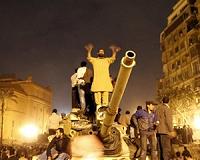 |
Munich, Germany (UPI) Feb 4, 2011 The ongoing turmoil in Egypt and the Middle East is expected to dominate talks among U.S. Secretary of State Hillary Clinton, German Chancellor Angela Merkel and a flock of other world leaders meeting at a three-day security conference in Munich. Issues on the agenda at the 47th Munich Security Conference, which kicked off Friday, include cybersecurity, NATO-Russia relations, Afghanistan and the security implications of the financial crisis. Clinton and Russian Foreign Minister Sergei Lavrov are to exchange signed treaties on nuclear disarmament Saturday, a move that will put into force the Strategic Arms Reduction Treaty -- a major anti-proliferation success for U.S. President Barack Obama. Yet while this could be a reason to cheer, the crisis in Egypt and the aftereffects felt across North Africa and the Middle East are likely to overshadow the Munich talks. The West has urged Egyptian President Hosni Mubarak to immediately launch a political transition but the Egyptian strongman has refused, saying such a move would lead to chaos. Wolfgang Ischinger, the organizer of the conference and a former German ambassador to the United States, said Egypt will be put on the agenda. "The conference is the ideal forum to discuss the situation in the region, which harbors enormous risks, but also great possibilities," he told the Frankfurter Neue Presse newspaper. Ischinger added that he was preparing a last-minute addition to the program to discuss the security implications of the political upheavals in North Africa and the Middle East, in a meeting "that will include representatives of the Arab nations and the major players of the region." Apart from Clinton, Lavrov and Merkel, world leaders including U.N. Secretary-General Ban Ki-moon, Britain's Prime Minister David Cameron, Afghan President Hamid Karzai and NATO Secretary-General Anders Fogh Rasmussen are to attend. The Middle East Quartet, comprised of the United States, the United Nations, the European Union and Russia, will meet on the sidelines of the summit on Saturday to discuss how to revive the stalled Mideast peace process. "It would be nice if the meeting could re-launch the Mideast peace process with more drive and determination," Ischinger said. Leaders value the Munich Security Conference for its informality, because it's not an official summit that requires politicians to take decisions or agree on the text of communiques. Rather, leaders can discuss security issues without the pressure of having to present an outcome.
Share This Article With Planet Earth
Related Links Democracy in the 21st century at TerraDaily.com
 Outside View: Egyptian unrest
Outside View: Egyptian unrestWashington (UPI) Feb 2, 2011 Is what is happening in Egypt today, and Tunisia earlier, the harbinger of viral unrest with consequences akin to the French Revolution of 1789 or the Russian Revolution of 1917 but in real time? Or, is this unrest a localized protest over the continuing absence of jobs, food and political inclusion that so far lacks an ideological motivation and is unlikely to spread throughout the reg ... read more |
|
| The content herein, unless otherwise known to be public domain, are Copyright 1995-2010 - SpaceDaily. AFP and UPI Wire Stories are copyright Agence France-Presse and United Press International. ESA Portal Reports are copyright European Space Agency. All NASA sourced material is public domain. Additional copyrights may apply in whole or part to other bona fide parties. Advertising does not imply endorsement,agreement or approval of any opinions, statements or information provided by SpaceDaily on any Web page published or hosted by SpaceDaily. Privacy Statement |